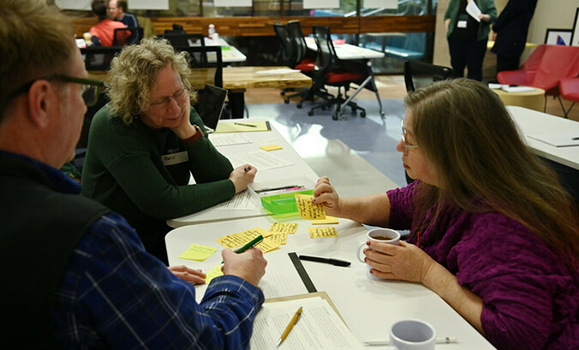One of the things that unites study breaks and exam seasons on campus is the relative quiet. But don‚Äôt mistake the lack of hustle and bustle for inactivity ‚ÄĒ¬†it‚Äôs just that you sometimes need to peer around a corner or two to find it.
Take the February study break, for example: while classes may have been on hiatus, if you had happened to walk by the Killam Library’s Ko’jua Okuom (the Indigenous community room) you would have seen a room full of instructors and others, jammed around Post-It Note-filled walls, deep in conversation about teaching and learning that breaks the usual university mould.
The occasion was Dal‚Äôs first Anti-Colonial Design Forum, hosted by the Centre for Learning and Teaching (CLT). The free event, hosted over two days, welcomed more than 100 participants both in-person and online, with remote attendees coming not only from Dal but from postsecondary institutions across Canada ‚ÄĒ even a few international ones.
‚ÄúIt came out of a conversation I had with a faculty member who was really looking to connect with other faculty members also working to navigate how to design courses in a de-colonial or anti-colonial way,‚ÄĚ explains Rachelle McKay, one of the event‚Äôs co-organizers and an educational developer with CLT specializing in Indigenous knowledges and ways of knowing.

Titled ‚ÄúGathering Together,‚ÄĚ the event‚Äôs goal was to bring together educators actively engaged or interested in exploring anti-colonial approaches in their teaching. Some of the themes explored included centring Mi‚Äôkmaw perspectives, community-engaged course design, and opportunities in land and/or community-based teaching & learning.
A journey of learning and unlearning
As one example, the opening discussion was hosted by a team from the Īꔄtv School of Occupational Therapy, including faculty members Dr. Brenda Beagan, Dr. Heidi Lauckner, Dr. Niki Kiepek, and Kaarina Valavaara, speaking to their own experiences bringing Indigenous perspectives and approaches into their program. Their hands-on activity involved participants categorizing strategies and pedagogies on a spectrum from anti-colonial (which points out and deconstructs Eurocentric approaches) to decolonial (which is founded at their core in non-colonial traditions and practices).

Dr. Heidi Lauckner of the School of Occupational Therapy.
‚ÄúI think everyone, whether they‚Äôre Indigenous or non-Indigenous, is on some point of a journey of learning and unlearning ‚ÄĒ¬†and I would put myself in there, because Indigenous peoples have been impacted by colonialism, too,‚ÄĚ says McKay, who is Anishinaabe Sturgeon Clan. ‚ÄúWe all start within that colonial education system and are on a journey of problematizing some of the elements of that system and looking for alternatives.‚ÄĚ
Across the remainder of the forum‚Äôs two-day agenda, facilitators from both Īꔄtv and Mount Saint Vincent University discussed lessons learned in particular studies or courses ‚ÄĒ academic activities and¬†topics as diverse as land-based field courses, inclusive computing, tourism and hospitality, and natural resources.
‚ÄúWe had this lineup of presenters and facilitators joining us from different places, different positionalities, and spaces that matter to them,‚ÄĚ says Shazia Nawaz Awan, another co-organizer and educational developer (international and intercultural competency) with CLT. ‚ÄúAnd then we had people from other universities as well who are working towards decolonizing their courses. We heard good things from people who attended, because this [forum] is really the first of its kind here.‚ÄĚ
Growing interest
The organizing team, which also included¬†Kate Thompson (education developer, scholarship of teaching and learning with CLT), sese the event as evidence of a wider and growing interest in both Indigenous education and anti- and de-colonial pedagogy at Īꔄtv. McKay hopes that there‚Äôs an opportunity to evolve the conversation into a wider community of practice, ‚Äúwhere groups of folks who are engaged in this sort of work can meet regularly and have space and community, even if it‚Äôs virtual, to offer ideas.‚ÄĚ
Community is also central to the theme of the CLT’s upcoming Conference on University Teaching and Learning later this month: Creating Connections: Building Communities Within, Between and Beyond our Institutions. For more information, visit the CLT website

